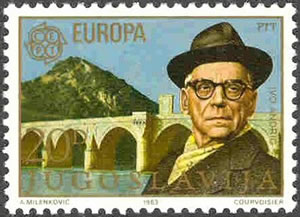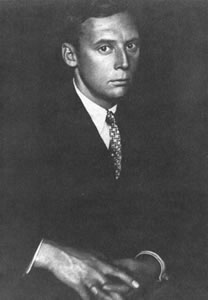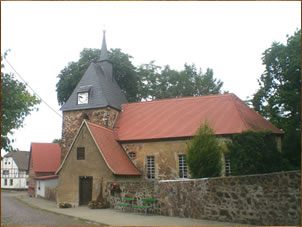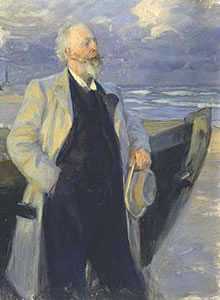De Servisch-Kroatische schrijver Ivo Andrić werd geboren op 9 oktober 1892 in het dorpje Dolac in de buurt van Travnik, Bosnië. Zie ook alle tags voor Ivo Andrić op dit blog.
Uit: The Pasha’s Concubine (Vertaald door Joseph Hitrec e.a.)
„In the forenoon of the second day, as he was returning from the drill field, the Pasha and his escort found themselves in the bazaar. They rode cautiously over the thawing ice. It was a market day, and in front of the Garić Bakery their way was blocked by some peasants’ horses laden with wood. While the flustered farmers began to hop and skip around the stubborn horses, the Pasha cast a glance into the bakery. Next to the closed brick oven stood the old baker Ali, stoop-shouldered, with rheumy, wizened eyes out of which tears kept oozing on his great white mustache. At the wide-open shopwindow, among the bread loaves and pans of meat and pies, was his daughter Mara. On her knees and propped on the counter with one arm, she had stretched the other for a platter on a shelf underneath. When she heard the shouts of the soldiers and the stamping of the peasants’ horses, she lifted her head, and the Pasha, seeing her wrapped like this around the counter, fell in love with her round, childish face and her merry eyes.
When he rode that way again in the afternoon, the bakery was deserted, the window half-shuttered, and on the sill was a purring cat with signed white hair.
He gave orders that the girl be found and brought to him. The noncommissioned officers and town constables ran eagerly to carry them out. He stayed over till noon of the third day, when they reported that the matter could be arranged. The girl had no one except her father. Her mother had been well-known Jelka, named Hafizadić after the old Mustaybey Hafizadić, who had kept her for several years and then married her off to this Garić, a quiet and simple-minded young man, to whom he had also given money to open the bakery.
The Pasha left some money and entrusted the matter to his old acquaintance Teskeredžić. And toward the end of March, on another market day, they brought the girl to him at Sarajevo.
The Pasha had not been wring in his judgment. She was the kind of woman he had always sought and particularly esteemed, the only kind that still attracted him. She was not quite sixteen. She had big eyes of a dovelike shade and muted porcelain luster, which moved languidly. Her hair was quite fair, heavy, and thick, such as was seldom seen on women in this region. Both her face and her arms were covered with a fine, light down that was noticeable only in sunlight.“

De Duitse dichter, schrijver, schilder en graficus Johannes Theodor Baargeld werd geboren op 9 oktober 1892 in Stettin. Zie ook alle tags voor Johannes Theodor Baargeld op dit blog.
Uit: Röhrensiedlung oder Gotik
„Jazz, Jazzband, Bandwurm. Der Burschensaft thomasinischer Printengänger vel expressive Spekulatiusarchitekten ist bei der Renovierung seiner durchlaufend honorierten Arbeiten auf den Kriminalvorwurf No. 2333/1920 geh. gestoßen. Der Podrekt 2333/1920 geh. wurde am 15. Januar 11.30 vorm. persönlich durch den Komunalbaueleven moritz remond eingebacken und verhandelt die Besandung des Röhrensystems durch den Auflauf des Kölner Doms. Nachdem die philoporne Klingel des Bundes zu dem Podrekt durch Ansaugen von Gefrierhosen Stellung genommen, erklärt der außerhalb der Haftpflicht stechende Pornodidakt rauchlose erst die Einfühlung der Kommunalgotik als Abbau der Ehe und droht mit der Kommunalisierung seiner Frau. Während albert einstein und die Sozialistin auguste rodin Glückwunschtelegramme häkeln, sägt die Zentrale w/3 der Bewegung dada für das einjährig-freiwillige Diözesan-Derby einen Vergleich auf dem Boden der Röhrenarchitektur aus. Die Abstimmungsgebiete werden sich bestimmen lassen, ob die Gewölbeparteien des Eiffelturmes zu vergraben sind, der ein freigelegter Keller ist und den Verstimmungen des Betriebröhrengesetzentwurfes widerspricht. Der Kosmopolid leo seiwet hat seine Geliebte geheiratet. Das Jubelpaar hat sich an die Zentrale w/3 Abt. Röhrenarchitinktur mit dem Büttel gesandt, der durch Anbringen von Röhrenfarcaden an den Brandmauern und Häuserhintern seines Viertels dem Tag ein Psychoparallelepitaph setzt. Der Geheimurn “Stätteerweiterung” des Dada Maschke B.D.B. hat in den Bäumen des städt. Ziertierentwertungsverwalts (Nippes, Schiefersburgerweg 150-154, Tel. A4491) eine plananatomische Ornamentalwarte verrichtet. Das Institut beabsichtigt mit einer Aufzahl Entwachsungen, abnormer Haarungen, Kotsteinerungen und Perlbildungen am weiblichen Akt den Ornamentalkanon der Röhrenaphrotektur auszukauen.”

Johannes Theodor Baargeld (9 oktober 1982 – 18 augustus 1927)
De Duitse schrijver Christian Reuter werd geboren op 9 oktober 1665 in Kütten bei Halle. Zie voor ook mijn blog van 9 oktober 2006 en ook mijn blog van 9 oktober 2010.
Uit: Der ehrlichen Frau Schlampampe Krankheit und Tod
„SCHLAMPAMPE. Nun, Sie gläubt mir’s auch nicht, Frau Gevatterin, wie ich so froh bin, daß ich keine Studenten mehr in meinem Hause habe.
CAMILLE. Sage Sie mir doch, Frau Gevatterin, was es mit den Hüpeljungen gewesen ist. Ich habe es noch keinmal recht erfahren können.
SCHLAMPAMPE. Sie gedenke doch nur, Frau Gevatterin, was die beiden losen Vögel Edward und Fidele vor Händel vorgenommen haben. Da kriegen sie ein paar Hüpeljungen und ziehen ihnen verschammerierte Kleider an, schicken sie in unser Haus eben den Tag, als mein Sohn Schelmuffsky aus der Fremde wiederkommen war. Wie wir nun über den Tische saßen und speiseten, so pochten sie draußen an. Wie meine Köchin zusiehet, wer da ist, sprechen die leichtfertigen Schelme, sie wären reisende Personen und ob sie nicht könnten Quartier bei mir haben. Meine Köchin, die kam mit großen Freuden wieder in die Stube hineingelaufen und sagte, es wären ein paar fremde Stutzer da, die ließen bitten, ob sie nicht könnten einen Abtritt bei mir nehmen. Nun, dachte ich, du kannst auch reisenden Leuten das Quartier nicht versagen, dieweil dein Haus ohndem ein Wirtshaus ist. Damit kamen sie nun anmarschieret und brachten ihre Worte sehr höflich für; der eine gab sich vor einen Baron aus und der andere vor ein Edelmann.
CAMILLE. Ich würde aber nun zum Henker gesehn haben, was ein Baron und Edelmann wäre oder was Hüpeljungen wären.
SCHLAMPAMPE. Je, herze Frau Gevatterin, wer wird sich denn flugs darauf besinnen.
CAMILLE. Nun, wie lief es denn weiter?“

Kütten, de kerk
De Deense dichter en schrijver Holger Drachmann werd geboren op 9 oktober 1846 in Kopenhagen. Zie ook mijn blog van 12 oktober 2006 en ook mijn blog van 9 oktober 2010.
Spring’s herald, hail!
_ Spring’s herald, hail! You’ve rent the forest’s quiet?
Your hair is wet, and you are leaf-strewn, dusty …
With your powers lusty
Have you raised a riot?
What noise about you of the flood set free,
That follows at your heels,–turn back and see:
It spurts upon you! –Was it that you fought for?
You were in there where stumps and trunks are rotting
Where long the winter-graybeards have been plotting
To prison safe that which a lock they wrought for.
But power gave you Pan, the ancient god!
They cried aloud and cursed your future lot?
Your gallant feat they held a robber’s fraud?
–Each spring it happens; but is soon forgot.
You cast you down beside the salt sea’s wave.
It too is free; dances with joy to find you.
You know the music well; for Pan resigned you
His art one evening by a viking’s grave.
But while on nature’s loving lap you lie,
The tramp of battle on the land you hear,
You see the steamers as they northward steer
With freedom’s flag;–of your name comes a cry.
And so is torn between the two your breast:–
Freedom’s bold fighters, who now proudly rally,
In nature’s life and legend dreamy rest;
The former chide, the latter lures to dally.
Your songs sound, some as were a war-horn braying,
Some softly purl like streams on reedy strand.
Half nature-sprite and half as man you stand,
The two not yet one law of life obeying.
But as you seem and as yourself you are
(The faun’s love that the viking’s longing tinges),
We welcome you, no lock is left nor bar,–
You bring along the door and both the hinges.
Just this it is that we are needing now:
The spring, the spring! These stifling fumes we bear
Of royal incense and of monkish snuff,
Of corpses in romantic cloak and ruff,
Are bad for morals and for lungs: Fresh air!
Rather a draught of Songs Venetian, cheerful,
With southern wantonness and color-wonders,–
Rather “Two Shots” (although they make us fearful)
Against our shallow breeding and its blunders.
Spring’s herald, hail! come from the forest’s choir,
From ocean’s roar, from armèd hosts and grim!
Though sometimes carelessly you struck the lyre,–
Where rich growth is, one can the rank shoots trim.
The small trolls jeer the gestures of a giant,
I love you so,–unique and self-reliant.

Holger Drachmann (9 oktober 1846 – 14 januari 1908)
Portret door Peder Severin Krøyer, 1895
